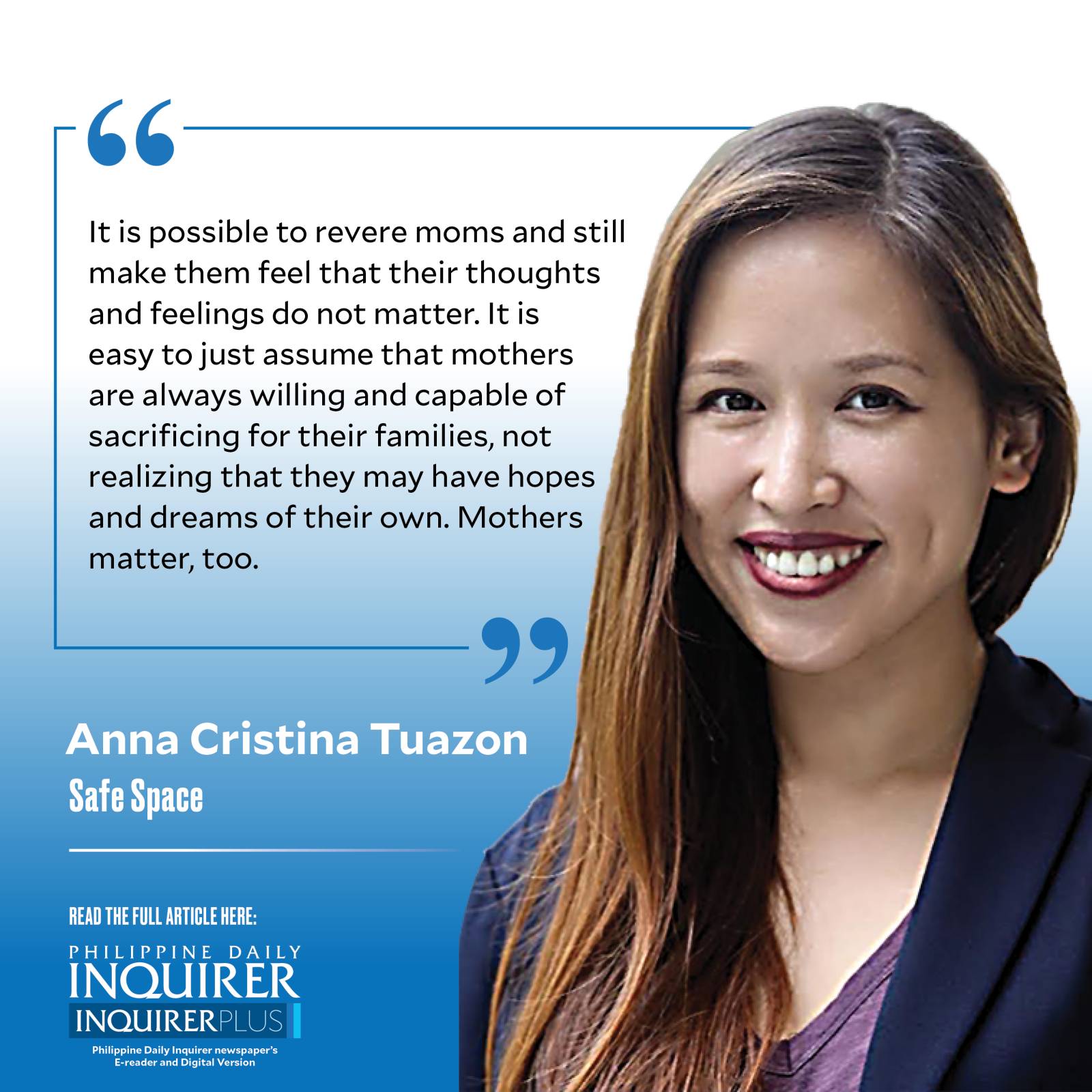Mental health month (3): Mothers matter, too

The mother is a revered symbol in our country. National artists like Fernando Amorsolo, Benedicto “BenCab” Cabrera, Vicente Manansala, and Napoleon Abueva have all depicted the mother and child in their works. There is also a strong Marian bent to our Catholicism. This seems to be, however, a double-edged sword: The mother is revered only for as long as she serves the child’s needs. We hold a stereotype of the “martyr mom”—the ever-sacrificing mother who puts her children and family’s welfare before her own. The harm of this image is that a mother is vilified the moment she prioritizes her own needs.
I distinctly remember this convenience food commercial from a long time ago where a harried mom rushes home from her overtime because her husband and son are sitting on the front steps, holding their stomachs in hunger. The ad was supposed to showcase how a meal can be done in minutes, but what I was left with was confusion as to why the grown-up dad who got home first couldn’t make the meal instead. And this guilt that was foisted on to the mom was for working long hours—most likely to support her family financially. What if a mother decided to make time for her own self-care, how much more “selfish” would she seem?
Article continues after this advertisementA woman’s reckoning with her motherhood starts even before a baby is conceived. As a child, baby dolls are foisted upon us and “bahay-bahayan” was encouraged. At this age, I see my friends struggle to have a child, feeling incomplete, or a purpose unfulfilled without one.
On the other side, I see other friends struggle to defend their decision to not have a child and having to justify that a childless life can be just as meaningful. The moment we get married, we get asked if a baby is on the way. If not, some well-meaning but tactless relatives will lament why not and accuse the couple of putting it off.
While most people are aware of postpartum depression, there is also peripartum anxiety and depression. Pregnancy, from personal experience, is one of the most tumultuous moments in one’s life. Nothing delivers ALL the emotions at the same time quite like it. Your body goes through never-ending changes and sensations, most of it not really pleasant. You are deprived of majority of medical relief so as to not risk the baby’s health, which means you have to bear your pain on your own. All your doctors seem to focus solely on your baby’s health and not necessarily on your well-being and comfort. As excited as you are for the new addition to the family, you are equally terrified at all the dangers that surround you. Suddenly, every sharp corner and exposed electrical outlet is the enemy. Every person’s cough and sneeze are potential vectors that could get you and your baby sick. Everyone offers unsolicited advice on what to eat and what to avoid. One can easily become paranoid while pregnant. Couple that with insomnia and chronic fatigue, it is almost a wonder whenever a pregnant woman does not succumb to anxiety and depression!
Article continues after this advertisementAfter birth has its own challenges. The body is still trying to put itself back together and yet we are expected to take care of the baby immediately. Mothers without extended support who are left alone in the home while the husband works are at most risk for postpartum depression. This makes me envious of other countries that have postpartum care centers, which are hotel-like facilities that allow the new mom and dad to recover and adjust to their new normal. Heck, I would take even just a much longer paternal leave so that dads can take care of the mom and baby while mom is still recovering.
We need to understand that the mother’s welfare is the baby’s welfare. You cannot have one without the other. A burnt-out mother has less internal resources to effectively care for a child. As such, we need to fully support the mother’s well-being. We need to lessen the pressures and burdens that we place on mothers’ shoulders and provide more relational and infrastructure support. Instead of telling expectant and new mothers what to do, it is much better to ask them what they need. We must always be mindful that mothers are humans and not saints. They have physical and emotional limits, just like all of us.
We need to protect and preserve the mother’s autonomy and their sense of self beyond motherhood. Mothers need a strong say on how they want to live their lives. We need mothers to cultivate rich lives outside of serving their children and family, if they so choose. They have a right to socialize, to have careers, and to have interests that are not related to their children.
It is possible to revere moms and still make them feel that their thoughts and feelings do not matter. It is easy to just assume that mothers are always willing and capable of sacrificing for their families, not realizing that they may have hopes and dreams of their own. Mothers matter, too.
—————-
aatuazon@up.edu.ph
















